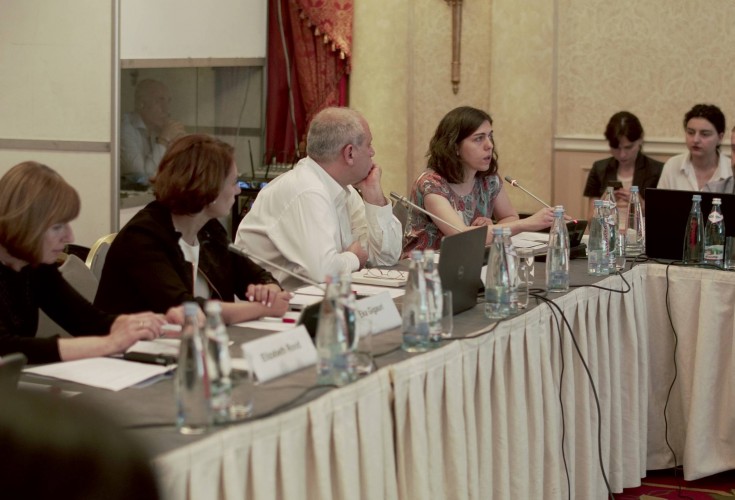The joint conference on Democratic Reforms in the Security Sector organized by Human Rights Education and Monitoring Center (EMC) and Transparency International Georgia (TI) presented findings of the report that indicates to the necessity of reforms of the State Security Service of Georgia. The conference was attended by representatives of the government, local and international organizations, diplomatic missions and experts on security sector, who assessed the legal underpinnings of the current system and deliberate on the prospective reforms that are required for the strengthening of the independence, accountability and transparency of the security sector.
The main findings and recommendations of the joint report “Reform of the Security Service in Georgia: Results and Challenges” by TI Georgia and EMC are the following:
- Main findings:
- As a result of the 2015 reforms, one powerful Ministry was broken down into two structures – with excess of powers, duplicated functions and high risks of abuse of power. The mandate and scope of authority of the State Security Service is not clearly defined in the legislation, which creates risks of abuse of power when coupled with the high secretive nature and weak control of the Service;
- Strong guarantees of independence and political neutrality of the Service are not defined on the legislative level;
- The appointment and/or early termination of the Head of the Service can be carried out with the sole decision of the ruling party. This, in turn, increases the risk of politicization of the system;
- Particularly problematic are the following instruments available to State Security Service: investigative function, including on corruption related crime, law enforcement and functions enabling use of force, possession of a temporary detention isolator, existing system for secret surveillance, and the so-called “ODR” institute;
- The oversight conducted over the State Security Service is not complex and a number of actors, including the Parliament, special bodies, executive government, judiciary, as well as the civil society, are not effectively and sufficiently involved in this process;
- A whole number of spheres and related activities are carried out the State Security Service without any oversight;
- From the day of the formation of the Service as a separate structure (in 2015), there was no audit held;
- The part of the statute of the State Security Service, which should include only the description of its functions, is classified;
- Public information is not issued based on the global principles of national security and rights to information, for example on the issuing of statistical information;
- Internal control mechanisms of the State Security Service are weak. There are no effective mechanisms for citizens to address the General Inspection of the State Security Service;
- Main Recommendations
- For the purposes of strengthening the coordination between the Security Service and other law enforcement agencies, as well as for the prevention of direct political control and influence over the Service, the monitoring over the activities of the Service, as well as the planning of its activities, should be carried out jointly by various branches of the government and the coordination council that is created with the participation of the leadership;
- Government directives made towards the Security Service should be subject to external, parliamentary oversight;
- The role of the legislature should be strengthened in the process of appointment of the Head of Service and the parliamentary minority should be more engaged;
- The process of dismissal of the Head of Service should be carried out under the same rules as impeachment procedures;
- As per international standards and practice, the State Security Service should not have an investigative function and its purpose should not be the investigation of criminal cases, or the carrying out of specific investigative operations;
- The State Security Service should not have law enforcement functions, which include a contact with citizens and the restriction of their rights in public space;
- The procedures for cooperation between the State Security Service and other respective investigative bodies should be defined by law;
- The State Security Service should not have the power to have a temporary detention isolator;
- The special operative department should be stripped off its right to conduct secret surveillance and this right should be transferred to an institutionally-independent body, which will not have a professional interest in this regard;
- The parliamentary committee exercising control over the state security service should establish a permanent expert oversight council, which will systematically control the security service and be accountable to the Parliament;
- The Public Defender should have the right to inspect the compatibility of the secret normative acts of the State Security Service with human rights standards on his/her own initiative, without the applications/complaints of the citizens and provide the Service with relevant recommendations. The Public Defender should be granted authority to raise questions with the Parliamentary supervisory board overseeing the State Security Service;
- The State Audit Office should set priorities of its audit activities so as to make it possible to efficiently oversee the expending institutions having secret funds, inter alia, the State Security Service;
- The classified statutes of the State Security Service should be declassified and made public.

